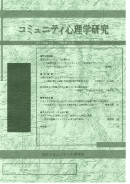Volume 12, Issue 1
Displaying 1-5 of 5 articles from this issue
- |<
- <
- 1
- >
- >|
Special Article
-
2008Volume 12Issue 1 Pages 1-22
Published: December 29, 2008
Released on J-STAGE: October 17, 2020
Download PDF (2075K)
Original Article
-
2008Volume 12Issue 1 Pages 23-34
Published: December 29, 2008
Released on J-STAGE: October 17, 2020
Download PDF (981K) -
2008Volume 12Issue 1 Pages 35-48
Published: December 29, 2008
Released on J-STAGE: February 15, 2022
Download PDF (19663K)
Case Reports
-
2008Volume 12Issue 1 Pages 49-64
Published: December 29, 2008
Released on J-STAGE: February 15, 2022
Download PDF (21658K)
Academic Essay
-
2008Volume 12Issue 1 Pages 65-72
Published: December 29, 2008
Released on J-STAGE: October 17, 2020
Download PDF (947K)
- |<
- <
- 1
- >
- >|
